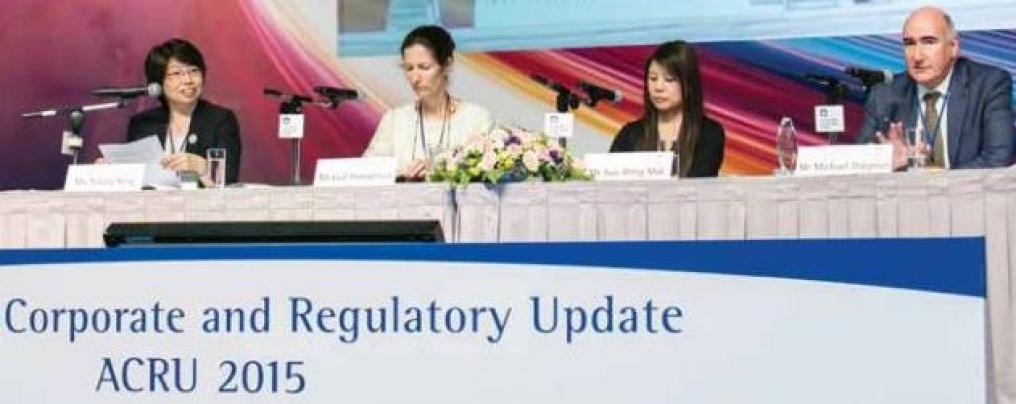The Institute's Annual Corporate and Regulatory Update (ACRU) seminar is one of the few forums in Hong Kong where regulators and market participants can engage in a direct dialogue about regulatory compliance. This year's ACRU, held on 3 June 2015, drew a record attendance of 1,600 participants. CSj highlights the major compliance issues raised at the seminar.
Last month, 1,600 participants together with representatives of Hong Kong's major regulatory bodies gathered in Hall 5 of the Convention and Exhibition Centre to discuss the changing regulatory landscape in Hong Kong. This event, the 16th Annual Corporate and Regulatory Update (ACRU) seminar organised by the Hong Kong Institute of Chartered Secretaries, comes at a very opportune moment for regulators and compliance professionals. In particular, over the last year since the previous ACRU, the market has been adapting to the new requirements brought in by the new Companies Ordinance. As you might expect, these requirements featured strongly in the ACRU 2015 discussions.
The seminar featured four sessions:
• In Session 1, two speakers from Hong Kong Exchanges and Clearing Ltd (HKEx) discussed corporate disclosure and the regulation of listed issuers.
• In Session 2, three speakers from the Securities and Futures Commission (SFC) discussed corporate disclosure, compliance with Hong Kong's Takeovers regime and the SFC's recently released Principles of Responsible Ownership.
• In Session 3, three speakers from the Companies Registry discussed compliance with the new Companies Ordinance, the filing requirements of the new Companies Ordinance and the launch of the Companies Registry's full-scale electronic filing service.
• In Session 4, a speaker from the Hong Kong Monetary Authority (HKMA) discussed the government's proposed resolution regime for financial institutions in Hong Kong.
The first cover story in this month's journal looks in detail at the corporate disclosure recommendations of this year's ACRU; this article will cover the other major compliance issues raised at the seminar.
The new Companies Ordinance
Compliance with the new Companies Ordinance, implemented in March 2014, remains at the top of most companies’ compliance agendas in Hong Kong. Ms Karen Ho, Deputy Principal Solicitor, Companies Registry, addressed some of the compliance issues causing most concern.
Abolition of the Memorandum of Association
The new Companies Ordinance abolishes the requirement to have a Memorandum of Association as a constitutional document of a local company. A company incorporated in Hong Kong under the new law is only required to have Articles of Association. Under the new Companies Ordinance, the information that was required to be contained in the Memorandum is now set out in the Articles of Association.
One area of doubt concerns whether a company formed and registered under the old Companies Ordinance needs to make changes to its constitutional documents as a result of the abolition of the Memorandum. Ms Ho clarified that this is not necessary. Provisions in the new Companies Ordinance mean that a condition of the Memorandum is deemed to be a provision of the Articles. Moreover, all references to the Memorandum in any other ordinances or documents are deemed to be references to the Articles. Similarly, following the abolition of par value, any conditions in a company's Memorandum setting out authorised share capital and the par value of shares is regarded as deleted.
Model Articles of Association
Another subject which featured in ACRU participants’ questions was the application of the new Model Articles prescribed by the new Companies Ordinance. Participants were not clear which companies these Articles apply to and whether companies have to formally adopt these Articles.
Ms Ho explained that the Model Articles replace Table A and Table C in the First Schedule to the old Companies Ordinance. They will apply by default to companies incorporated under the new Companies Ordinance if no additional Articles are filed by the company, or, even if filed, in so far as the registered articles do not exclude or modify the Model Articles. She emphasised that companies are free to create their own bespoke Articles if they wish; alternatively they can choose to adopt the Model Articles in their entirety or with amendments.
Ms Ho also clarified that the Model Articles do not apply by default to companies incorporated under the old Companies Ordinance. She explained that there is no obligation for such companies to amend their Articles to include the Model Articles, but they may wish to review their Articles to ensure that they will be able to take advantage of some of the new business facilitation measures brought in by the new Companies Ordinance, for example the provisions on financial assistance for the acquisition of shares, the non-court based reduction of capital and capitalisation of profits under the new no par regime.
If companies do wish to modify their Articles, they will be required to follow the appropriate legal procedures, which involve the passing of a special resolution. Ms Hilda Chang, Deputy Registry Manager, Companies Registry, explained the filing requirements for any alteration of companies’ Articles of Association. Her Session 3 presentation also updated attendees on a number of other issues relating to the filing of documents with the Companies Registry. The Companies Registry has specified 83 forms for use under the new Companies Ordinance, and nine forms for use under Cap 32 – which has become the Companies (Winding Up and Miscellaneous Provisions) Ordinance (see Figure 1).

Takeovers regime update
In Hong Kong, takeovers, mergers, privatisations and share buy-backs are regulated under the Codes on Takeovers and Mergers and Share Buy-Backs. Gail Humphryes, Senior Director, Corporate Finance, SFC, heads the Takeovers Executive at the SFC and she took the opportunity of her ACRU presentation to explain what the Takeovers Executive does and what it doesn’t do. Starting with the latter, she clarified that the team does not make judgements about the commercial merits of takeover offers – this is best left to shareholders, she said. Primarily, the team undertakes the investigation of takeovers, mergers and share buybacks and monitors related dealings in connection with the Codes.
The Takeovers Executive is also available for consultation and to give rulings on all matters to which the Takeover Codes apply. 'If in doubt, consult us,’ Ms Humphryes said. She went on to discuss compliance issues relating to Hong Kong's takeovers regime.
Ms Humphryes emphasised that issuers involved in activities caught by the Takeovers Codes have an obligation to file all relevant documents with the Takeovers Executive for comment prior to release. The definition of 'document’, she explained, is very wide – this includes: 'any announcement, advertisement or document issued or published by any party to an offer, or possible offer, in connection with such offer or possible offer’. The only exceptions are documents which are required to be put on display for inspection under Notes 1 and 2 to Rule 8 of the Takeovers Code, and PostVet announcements. A list of Post-Vet announcements is available on the SFC website.
This filing requirement includes an announcement that a company is in talks for a possible takeover. Ms Humphryes drew this point to the attention of the company secretaries in the audience. 'If you make such an announcement without contacting us first, it will be embarrassing since you will have to explain to your directors why you did that,’ she said.
She also clarified that there is no obligation to announce that talks have commenced as long as the talks are kept confidential. 'If you don’t want to make a talks announcement, the most critical thing is to keep the talks a secret,’ she said. If the talks qualify as inside information as defined in the Securities and Futures Ordinance, however, or if there are unusual movements in the share price of the relevant companies indicating that knowledge of the talks has leaked to the market, an announcement must be made.
Finally, Ms Humphryes recommended relevant parties read the SFC's Practice Note 20 (available on the SFC website: www.sfc.hk), which collates the SFC's relevant practice recommendations. 'Once we have issued a practice note we're not very impressed if you don’t follow it,’ she said.
Regulation of listed issuers
In addition to addressing compliance with Hong Kong's disclosure requirements (covered in this month's first cover story), Dion Wong, Senior Vice-President, Compliance and Monitoring, Listing Department, HKEx, also highlighted a number of general compliance problem areas identified by HKEx.
One area of concern is the possible abuse of placings of warrants under general mandate. There has been an increase in the number of such placings in recent years where their commercial rationale was questionable. Ms Wong highlighted the fact that, where warrants are not properly priced, they can result in an unfair dilution of shareholders’ interests. 'Warrants may be placed under general mandate only if the issuer can demonstrate that the warrants are issued at, or approximately at, their fair value,’ she said. She added that directors are obliged to demonstrate that the warrant issue price represents fair value.
Financial regulation in Hong Kong
If a major financial institution went down tomorrow, what would be the consequences for Hong Kong? The HKMA took the opportunity of this year's ACRU seminar to brief participants on the current initiative to establish a resolution regime for financial institutions in Hong Kong. In his Session 4 presentation, Dr Martin Sprenger, Head of Policy Research and Development at the HKMA, pointed out that the collapse of Lehmann Brothers in 2008 led to shock waves in financial markets around the world, including Hong Kong. Governments used vast sums of public money to rescue financial institutions during the ensuing global financial crisis.
Does Hong Kong need a resolution regime for financial institutions?
One good thing to come from this collapse, however, was a renewed political will to establish the regulatory infrastructure needed to avoid financial instability while protecting taxpayers should a systemically important financial institution fail in the future. This led to the Financial Stability Board (FSB) publishing its Key Attributes of Effective Resolution Regimes for Financial Institutions in 2011.
Figure 2 shows that financial regulators in Hong Kong have very few of the powers identified by the FSB as being a necessary part of an effective resolution regime. Dr Sprenger warned that Hong Kong would therefore be vulnerable if a systemically important financial institution were to fail. He argued that providing regulators with the full set of resolution options and powers in accordance with the FSB recommendations is necessary, not only to protect financial stability in Hong Kong, but also to ensure that Hong Kong has the ability to cooperate internationally in resolutions. Some 29 out of the 30 global systemically important banks, and eight out of the nine global systemically important insurers are present in Hong Kong. If one of these institutions went down, Hong Kong would need to work with other jurisdictions to deal with the fallout.

Dr Sprenger also pointed out that Hong Kong is a relatively small jurisdiction, so the value of these major financial institutions is proportionally greater than in larger jurisdictions when measured against Hong Kong's GDP. He also pointed out that Hong Kong lags behind other FSB-member jurisdictions in implementing an effective resolution regime.
The proposed resolution regime for Hong Kong
The government and financial regulators in Hong Kong have already put out two consultations (in January 2014 and January 2015) proposing the legislative changes required to establish a resolution regime in Hong Kong. 'The majority of responses are supportive and the need for a resolution regime for financial institutions is widely accepted in Hong Kong,’ Dr Sprenger said.
The proposals envisage giving powers to three 'resolution authorities’ – the HKMA, the SFC and the Office of the Commissioner for Insurance. They would step in if a systemically important financial institution is, or is expected to become, non-viable with no reasonable prospect that private sector action could be taken to recover the situation. They will manage the resolution process to ensure the continuity of critical financial services and to ensure the general stability and working of the financial system.
Exactly how they will go about achieving those ends is still in doubt. Depending on the circumstances, the resolution authorities might transfer the institution to a commercial purchaser or, as a temporary arrangement, to a 'bridge' institution. It is also proposed that the regime should support resolution by means of an officially mandated creditorfinanced recapitalisation (commonly known as a bail-in). The current model also includes a temporary public ownership option, for use as a last resort if other options will not protect financial stability adequately.
There are plans for a third consultation paper before the proposed legislative bill can be drafted. The government hopes to introduce the proposed Bill into LegCo in Q4 2015.
The Institute's 16th Annual Corporate and Regulatory Update seminar took place on 3 June 2015. More photos of the event are available on the HKICS website: www.hkics.org.hk.
More information about the government's proposed resolution regime for Hong Kong is available on the websites of the Financial Services and Treasury Bureau: www.fstb.gov.hk; the Hong Kong Monetary Authority: www.hkma.gov.hk; and the Securities and Futures Commission: www.sfc.hk.

 Dr Sprenger also pointed out that Hong Kong is a relatively small jurisdiction, so the value of these major financial institutions is proportionally greater than in larger jurisdictions when measured against Hong Kong's GDP. He also pointed out that Hong Kong lags behind other FSB-member jurisdictions in implementing an effective resolution regime.
Dr Sprenger also pointed out that Hong Kong is a relatively small jurisdiction, so the value of these major financial institutions is proportionally greater than in larger jurisdictions when measured against Hong Kong's GDP. He also pointed out that Hong Kong lags behind other FSB-member jurisdictions in implementing an effective resolution regime.



